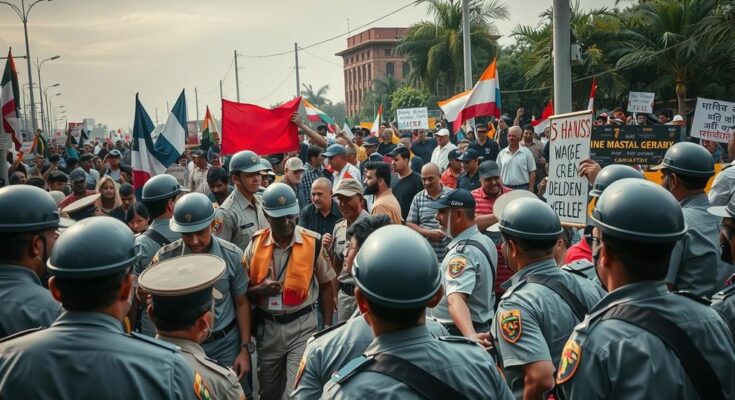Mozambique police opened fire on a peaceful opposition parade on March 5, 2025, injuring at least 16 individuals, including children, amidst protests against rising living costs and contested election results. Despite constant police presence, the gathering, led by Venancio Mondlane, was attacked by officers using tear gas and live ammunition. Authorities face calls for accountability and reforms in policing methods to prevent further violence.
On March 5, 2025, Mozambique police perpetrated violence against a peaceful opposition parade in Maputo, injuring at least 16 individuals, including two children, according to Human Rights Watch. The gathering was organized by Venancio Mondlane, a former presidential candidate, where participants sang and danced before the sudden attack took place.
The procession, comprising a convoy of approximately six vehicles, traveled about three kilometers without incident amidst heavy police presence. The occasion coincided with the signing of a political agreement intended to initiate a two-year dialogue for reforms following the country’s electoral crisis, yet Mondlane was excluded from these discussions.
Ashwanee Budoo-Scholtz, deputy Africa director at Human Rights Watch, condemned the police’s actions as a severe violation of life and legality. She urged the need for a thorough investigation into the unprovoked assault on peaceful protesters and for accountability of those responsible.
Since October 2024, Mozambique has witnessed widespread demonstrations contesting the election results and addressing rising living costs and social issues. Security forces have been accused of numerous human rights violations, including the unlawful killing of over 300 individuals during crackdowns on these protests.
During the incident, as Mondlane’s convoy neared a barricade created by the Police Rapid Intervention Unit, officers began firing tear gas and live ammunition without warning, causing chaos among the crowd. Witnesses described the situation transforming from a celebration to a scene of terror instantaneously.
According to a local organization, Plataforma Decide, bullets and tear gas resulted in the most severe injuries, exacerbated by the panic felt by the crowd. A police representative justified the use of tear gas, alleging that the parade disrupted traffic; however, the signing ceremony was not scheduled to commence for several hours.
Despite a police spokesman claiming ignorance regarding the usage of live rounds, he acknowledged that several individuals were injured during the ensuing panic.
On March 9, the newly appointed Minister of Justice, Mateus Saize, criticized the police for their frequent use of live ammunition and encouraged them to adopt less-lethal methods to prevent violence. The use of lethal force, particularly against nonviolent demonstrations, is heavily restricted under international guidelines and human rights standards.
Authorities are called to prioritize the reform of security forces and ensure that those affected by police brutality receive adequate assistance. Human Rights Watch advocates for tangible actions beyond mere verbal recommendations to enhance accountability and safety within law enforcement practices.
In conclusion, the violent actions of Mozambique police against a peaceful opposition parade highlight a significant breach of rights and protocols. The incident raises urgent concerns regarding the treatment of dissent and the necessity for comprehensive police reforms. As the nation grapples with rising tensions, it is crucial for authorities to uphold human rights standards and implement effective measures that ensure public safety while respecting citizens’ rights to peaceful assembly.
Original Source: www.hrw.org




